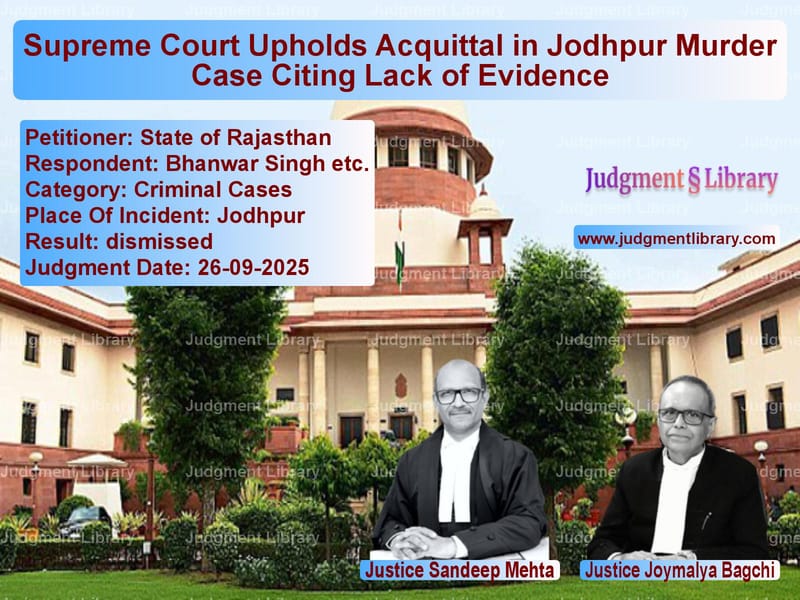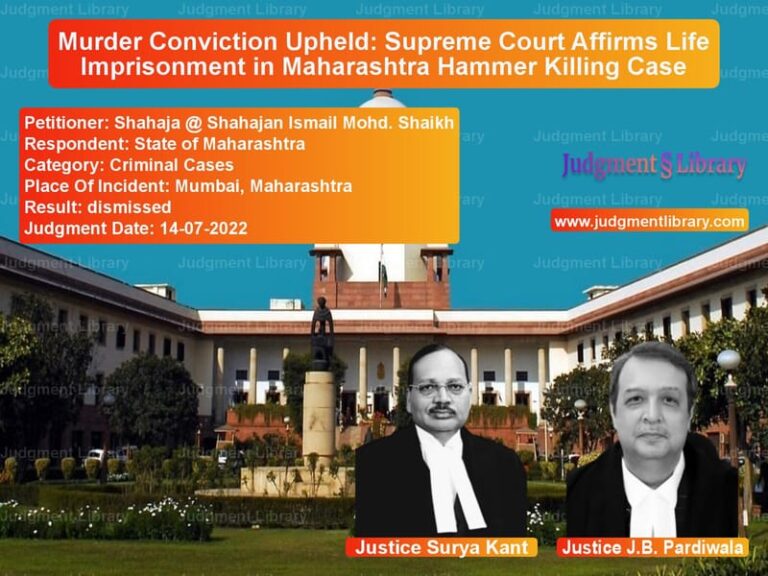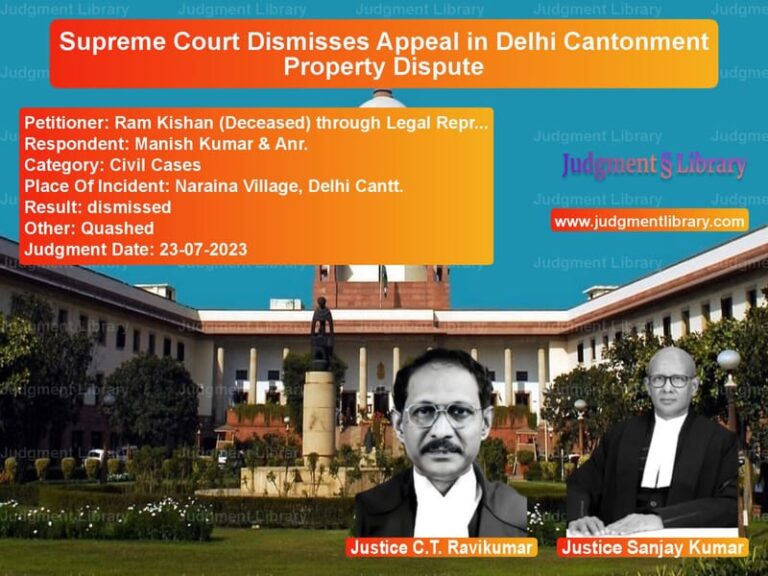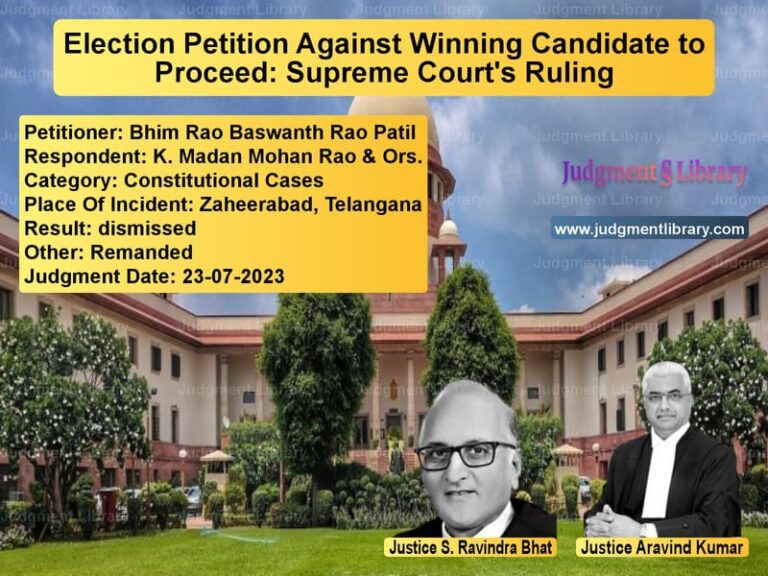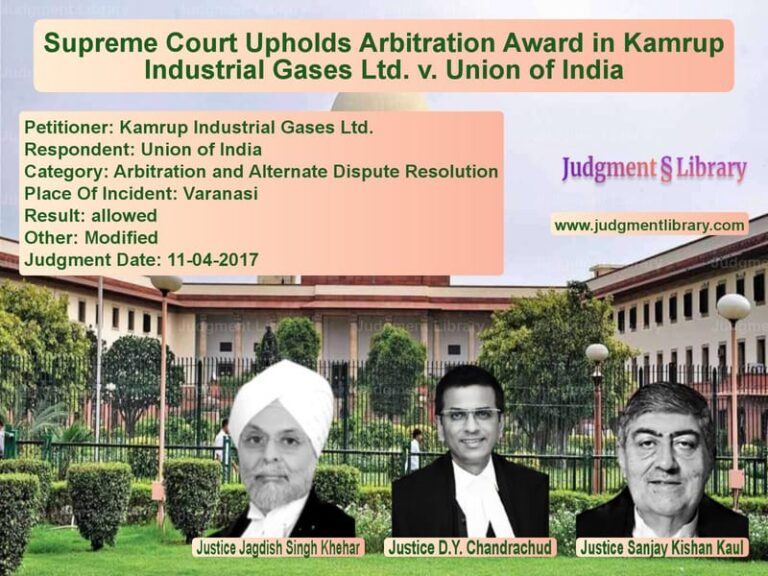Supreme Court Upholds Acquittal in Jodhpur Murder Case Citing Lack of Evidence
In a significant ruling that underscores the importance of concrete evidence in criminal trials, the Supreme Court of India has dismissed the State of Rajasthan’s appeal and upheld the acquittal of three individuals accused in a high-profile murder case from Jodhpur. The judgment, delivered on September 26, 2025, brings closure to a legal battle that spanned nearly two decades, highlighting the fundamental principle that suspicion, no matter how strong, cannot replace legal proof in a criminal case.
The case dates back to January 2006 when Suresh Sharma, a resident of Jodhpur, went missing after leaving his home to visit agricultural fields. His son, Navneet Sharma, filed a missing person report, expressing concerns about ongoing land disputes his father had with certain individuals. The situation turned grim when Suresh Sharma’s body was discovered the next day between villages Jajiwal Gahlotan and Jajiwal Bhatiyan. The scene was disturbing—his hands tied behind his back with iron wire, legs fastened with cloth, face crushed to efface identity, and clear signs of strangulation. The postmortem examination confirmed antemortem strangulation as the cause of death, noting approximately 20 injuries on the body.
The police investigation led to the arrest of three accused: Bhanwar Singh, Hemlata, and Narpat Choudhary. The prosecution alleged that Hemlata and her husband Narpat Choudhary were perturbed because Suresh Sharma frequently visited their house, while Bhanwar Singh had land disputes with a woman named Sayri Devi, whom Suresh Sharma supported. The prosecution claimed that these motives fueled a criminal conspiracy to eliminate Suresh Sharma, involving hired killers from Uttar Pradesh who allegedly stayed at hotels arranged by Narpat Choudhary. According to the prosecution, Suresh Sharma was lured to Hemlata’s residence, strangled, and his body transported in Narpat Choudhary’s Maruti van to be dumped on the roadside.
The trial court convicted all three accused in 2008, sentencing them to life imprisonment under Sections 302 (murder) read with 120-B (criminal conspiracy) of the Indian Penal Code, along with other charges. However, in December 2011, the Rajasthan High Court acquitted all three, granting them the benefit of doubt due to insufficient evidence and patent infirmities in the prosecution’s case. The State of Rajasthan then approached the Supreme Court, challenging this acquittal.
The Supreme Court’s Analysis of Evidence
The Supreme Court bench comprising Justices Sandeep Mehta and Joymalya Bagchi meticulously examined each piece of evidence presented by the prosecution. The court began by addressing the alleged motive behind the murder. The trial court had attributed different motives to the accused—Hemlata and Narpat Choudhary were allegedly disturbed by Suresh Sharma’s frequent visits to their house, while Bhanwar Singh supposedly bore a grudge due to land disputes. However, the Supreme Court found these theories unconvincing. The complainant Navneet Sharma (PW-15) himself stated that his father and Hemlata maintained good relations, and Meena Sharma (PW-24), the deceased’s wife, confirmed that Hemlata and Narpat Choudhary visited their house only as clients, with no other relationship. The court noted: “The witness (PW-15) denied having knowledge about any kind of exploitation or victimisation of respondent-Hemlata by his father.” Regarding Bhanwar Singh’s alleged motive, the court found the evidence of Sayri Devi (PW-12) to be full of “gross exaggerations and improvements” from her previous statement, and thus rightly discarded by the High Court.
The prosecution heavily relied on the ‘last seen’ theory, presenting witnesses Hukum Singh (PW-8) and Dharmender Singh (PW-20) who claimed to have seen Suresh Sharma parking his scooter near Hemlata’s house on the evening of January 22, 2006. However, the Supreme Court found their testimony unreliable. Crucially, neither witness actually saw Suresh Sharma entering Hemlata’s house. More importantly, Hukum Singh (PW-8) disclosed this information to the police only on February 28, 2006—over a month after the incident—despite having signed the inquest memo on January 23, 2006. The court observed: “The failure of the witness (PW-8) in not disclosing this important fact to the police for almost one month and six days of the incident assumes great importance because he was amongst the first few to have seen the dead body of the deceased-Shri Suresh immediately after its discovery.” The court agreed with the High Court’s finding that “the conduct of Hukum Singh (PW-8) in keeping silent for more than a month to be highly suspicious.” Dharmender Singh (PW-20) similarly delayed reporting the information for 20-25 days, which the court found to be “unnatural conduct.”
The prosecution also presented recovery evidence, including a chunni (stole) with blood stains recovered from Hemlata’s house. However, the Supreme Court noted that no forensic opinion was obtained about the blood group on the chunni, making it impossible to connect it to the deceased. The court also found it strange that the accused would leave such evidence in their house for five days when they had full control over the premises. The court upheld the High Court’s observation that “the fact that the chunni was recovered from the house which remained unlocked till the police brought back respondents-Hemlata and Narpat Choudhary for inspection rendered the recovery under Section 27 of the Evidence Act irrelevant, as it was effectively recovered from a place accessible to all and sundry.”
Other recoveries, including hotel registers allegedly showing accommodation for hired killers and a Maruti van with blood stains, were also found inconclusive. The hotel registers did not connect Narpat Choudhary to any hired killers, and the blood stains in the van did not yield positive results for blood grouping. Regarding call detail records presented to prove conspiracy, the prosecution failed to produce a certificate under Section 65-B of the Evidence Act, making them inadmissible. The court firmly stated: “Taken together, both the circumstances, i.e., non-production of the certificate under Section 65-B of the Evidence Act, and the call detail records being presented through a handwritten note without examining the scribe thereof would lead to an inescapable conclusion that the call details were not proved as per law.”
Legal Principles and Final Ruling
The Supreme Court reiterated the well-established principles governing interference with acquittals, as outlined in Babu Sahebagouda Rudragoudar v. State of Karnataka: “That the judgment of acquittal suffers from patent perversity; That the same is based on a misreading/omission to consider material evidence on record; and That no two reasonable views are possible and only the view consistent with the guilt of the accused is possible from the evidence available on record.” Applying these principles, the court found that the High Court’s acquittal was based on proper appreciation of evidence and that the prosecution had failed to prove its case beyond reasonable doubt.
The court concluded: “We give our full imprimatur to the conclusion drawn by the High Court in the impugned judgment that the recovery of chunni was concocted and planted. The other recoveries effected by the investigating officer were insignificant. The theory of motive and last seen was nothing but a conjectural story. Thus, there is no evidence worth the name on the record of the case so as to connect respondents-Hemlata and Narpat Choudhary with the murder of the deceased-Shri Suresh.” Regarding Bhanwar Singh, the court noted: “Other than the evidence of the so-called threat given by respondent-Bhanwar Singh in presence of Sayri Devi (PW-12), which the High Court found to be highly doubtful and exaggerated, no other evidence was led by the prosecution to link respondent-Bhanwar Singh with the alleged murder of the deceased-Shri Suresh.”
The Supreme Court’s dismissal of the State’s appeal reinforces a fundamental principle of criminal jurisprudence: the prosecution must prove its case beyond reasonable doubt with reliable and admissible evidence. In this case, the evidence presented—whether regarding motive, last seen theory, or recoveries—was found to be insufficient, unreliable, or improperly proved. The judgment serves as a reminder that in criminal trials, the burden of proof rests squarely on the prosecution, and convictions cannot be based on conjecture, suspicion, or incomplete evidence. For the three accused—Bhanwar Singh, Hemlata, and Narpat Choudhary—this ruling brings finality to their long legal ordeal, upholding their presumption of innocence that the prosecution failed to rebut with concrete evidence.
Petitioner Name: State of Rajasthan.Respondent Name: Bhanwar Singh etc..Judgment By: Justice Sandeep Mehta, Justice Joymalya Bagchi.Place Of Incident: Jodhpur.Judgment Date: 26-09-2025.Result: dismissed.
Don’t miss out on the full details! Download the complete judgment in PDF format below and gain valuable insights instantly!
Download Judgment: state-of-rajasthan-vs-bhanwar-singh-etc.-supreme-court-of-india-judgment-dated-26-09-2025.pdf
Directly Download Judgment: Directly download this Judgment
See all petitions in Murder Cases
See all petitions in Judgment by Sandeep Mehta
See all petitions in Judgment by Joymalya Bagchi
See all petitions in dismissed
See all petitions in supreme court of India judgments September 2025
See all petitions in 2025 judgments
See all posts in Criminal Cases Category
See all allowed petitions in Criminal Cases Category
See all Dismissed petitions in Criminal Cases Category
See all partially allowed petitions in Criminal Cases Category

